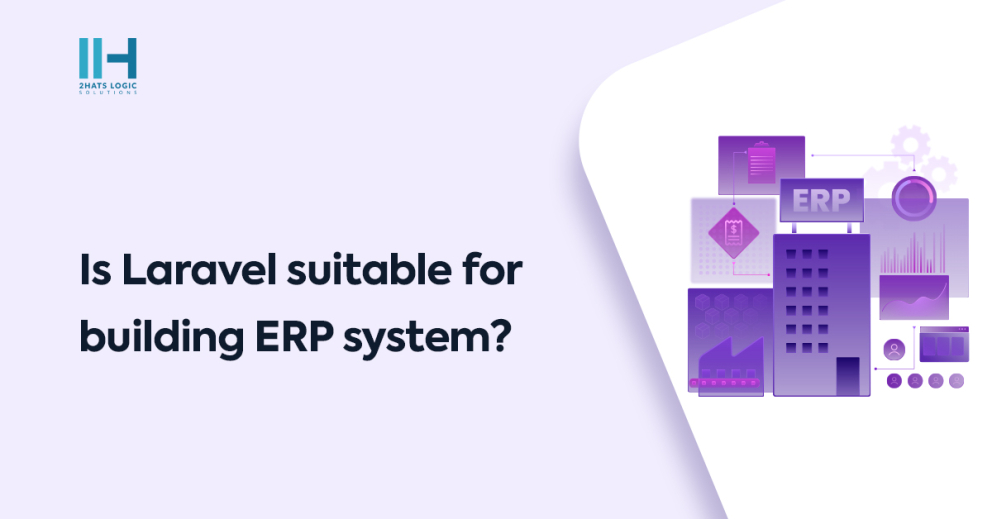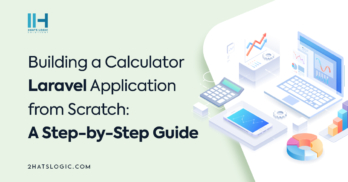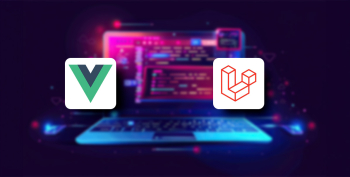Greetings! I'm Aneesh Sreedharan, CEO of 2Hats Logic Solutions. At 2Hats Logic Solutions, we are dedicated to providing technical expertise and resolving your concerns in the world of technology. Our blog page serves as a resource where we share insights and experiences, offering valuable perspectives on your queries.

Discover how Laravel ERP development offers a flexible, simple solution to enhance your business processes. Let’s learn about ERP systems and how Laravel ERP development would be a great choice.
What is an ERP System?
An ERP (Enterprise Resource Planning) system is complex software that can integrate and manage the core business processes of an organization. It covers finance, human resources, supply chain, and customer relationship management, among other areas, to result in a fully centralized and unified platform.
The main objective of an ERP system in Laravel is to improve operations collaboration, efficiency, and data visibility, thus enabling organizations to make informed decisions with a holistic view of operations. Using Laravel for the ERP system ensures adaptability and customization for your unique business needs.
The Laravel Advantage in Web Application Development
Laravel ERP system is a good choice for web application development. Laravel is elegant, simple, and full of features that empower developers to build scalable, maintainable web applications.
Its MVC (Model-View-Controller) architecture delivers a clear framework, and for ERP solutions, it is particularly well-suited. Additionally, Laravel’s expressive syntax, ORM (Object-Relational Mapping) capabilities, and extensive ecosystem of pre-built packages allow developers to build dynamic and feature-rich ERP applications efficiently.
Why Laravel for ERP Systems?
The selection of the right framework is significant when developing complex systems like ERP. Here’s why ERP Laravel is a compelling choice:
- Modular Architecture
Laravel’s modular design aligns well with the modularity of ERP systems, allowing businesses to scale and customize functionalities seamlessly as their requirements grow. - Rapid Development
Laravel ERP development accelerates project timelines with its developer-friendly tools, including Artisan commands and pre-built packages, ensuring faster time-to-market. - Security
Built-in protection against vulnerabilities ensures your ERP system in Laravel is secure and reliable, instilling confidence in users and stakeholders. - Scalability
Whether you’re managing a small business or a large enterprise, ERP in Laravel adapts to growing demands, making it a versatile choice for businesses of all sizes. - Community and Support
Laravel’s active community ensures access to extensive documentation, tutorials, and expert forums, simplifying the development of ERP solutions.
Contact us today for expert Laravel development services
Features of Laravel Supporting ERP Development
Laravel is a popular PHP web framework known for its elegant syntax, expressive features, and developer-friendly tools. Here are five important features of Laravel:
- Eloquent ORM (Object-Relational Mapping)
Streamlines database interactions, ensuring your ERP system Laravel has robust and reliable database management. - Blade Templating Engine
Enables the creation of interactive and dynamic dashboards, which are essential for Laravel ERP systems. - Artisan Console
Simplifies routine tasks like migrations, seeding, and testing, helping accelerate Laravel ERP development workflows. - Middleware
Adds an extra layer of control and security, ensuring seamless access control and data integrity in ERP systems. - Laravel Mix
Facilitates asset compilation and optimization, ensuring efficient front-end performance for ERP applications.
Challenges to Consider
- Complexity
Developing an ERP in Laravel requires expertise in database design, modular architecture, and security. - Performance
Enterprise-level ERP systems demand optimization and robust hardware infrastructure for peak performance. - Maintenance
Maintaining a custom Laravel ERP system can be resource-intensive, requiring regular updates and monitoring. - Lack of Native ERP Features
While Laravel is powerful, it doesn’t include pre-built ERP modules for tasks like accounting or inventory, requiring custom development.
Pros and Cons of Laravel ERP
| Pros | Cons |
| Strong Foundations: Robust MVC architecture, secure authentication, and rich ecosystem. | Complexity: Requires expertise in database design, security, and front-end frameworks. |
| Scalability: Handles large databases and workflows, ideal for growing businesses. | Performance: Enterprise-grade optimization needs careful resource management. |
| Flexibility: Supports customization and extensions to meet unique business needs. | Limited ERP Features: No built-in ERP modules like accounting or CRM; packages may lack coverage. |
| Rapid Development: Features like Artisan CLI accelerate development and prototyping. | Maintenance: Custom-built ERP systems demand ongoing updates and bug fixes. |
| Community Support: Large active community and comprehensive documentation available. | Dependency Risks: Third-party packages may introduce complexities in long-term projects. |
When Should You Choose Laravel for ERP Systems?
Laravel is the right choice for ERP development if:
- You need customized ERP Laravel solutions tailored to unique business processes.
- Your business prioritizes scalability and modularity for future growth.
- You aim for rapid prototyping and faster time-to-market.
- You have access to experienced Laravel ERP development teams for implementation.
Conclusion
Choosing Laravel for your ERP system can be a smart move given the right conditions. With skilled developers, well-defined requirements, and a solid plan for scalability and maintenance, the ERP system in Laravel offers the flexibility and efficiency needed to streamline business operations.
However, it’s essential to evaluate your specific business needs to ensure Laravel aligns with them. Opt for experienced developers to unlock the full potential of a secure, scalable, and robust Laravel ERP system tailored to your goals.

Related Articles






